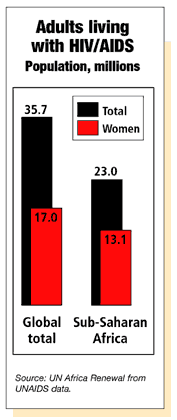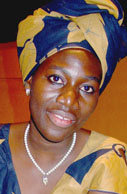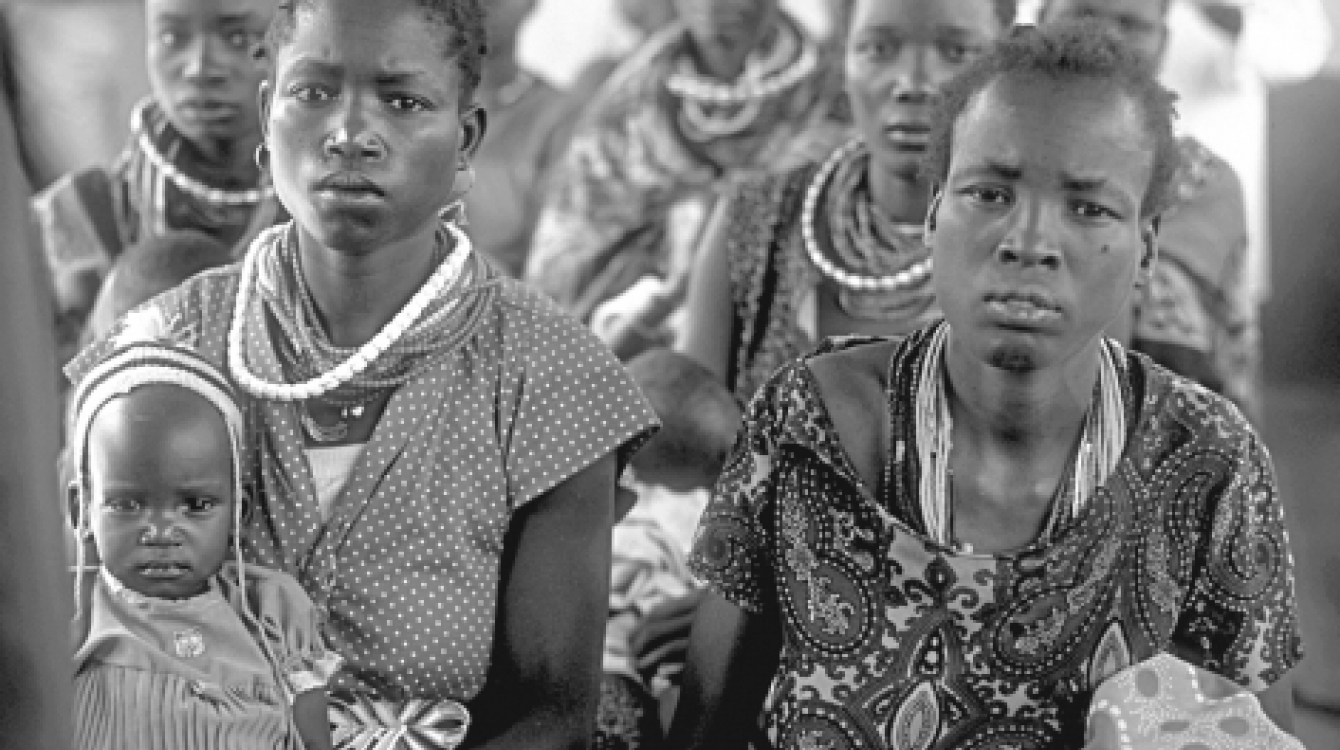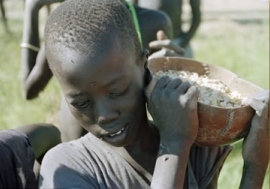Women: the face of AIDS in Africa
Women: the face of AIDS in Africa
* Get more information on UNAIDS and its activities against the disease at: www.unaids.org
There are days when Mary Mwasi does not know where she will find the strength to get out of bed. But sickness, exhaustion and despair will not feed the children or fetch the water, and so, somehow, she wills herself erect and steps into the sunlight of another Kenyan morning. "I have to look for food for the children day by day," she told a counselor for the US charity World Vision. "Life is difficult. Unless I get help from well-wishers, we cannot afford to eat."
Like many other residents of Ghaza, a village near the port city of Mombasa, Mrs. Mwasi is infected with HIV, the virus that causes AIDS. At least one of her three children is also HIV-positive and the others are often ill -- whether from the disease or malnutrition, she cannot be sure. Her husband left in search of work two years ago and never came back, so she lives on sufferance on her in-laws' land -- fearful that they will learn of her condition and expel her from the community. Her only financial assets are a few chickens, held in reserve to buy medicine for the kids.
She knows there is no hope for her. Her concern is for her children. "We say, 'When you pour water on the ground, you cannot pick it up again,'" Mary told the counselor. "I did not think of so many things before, so many worries. I am trying to leave everything to God."
As HIV/AIDS enters its third calamitous decade, Mary Mwasi's plight has become tragically common in East and Southern Africa, the regions hit hardest by the global epidemic. With 10 per cent of the world's population, impoverished sub-Saharan Africa is home to two-thirds of its HIV-positive population. But it is only recently that doctors, governments and the Joint UN Programme on HIV/AIDS (UNAIDS)* have realized that not only does the global struggle against AIDS have an African face, it is increasingly the face of an African woman. As infection rates mount, scientists and researchers are scrambling to understand the causes and to fashion new policies and programmes in response.
Young women an 'endangered species'
The need for urgency is clear. In July, UNAIDS announced that of all Africans aged 1549 who are HIV-positive, women make up a disproportionate 57 per cent. Even worse, noted UNAIDS Deputy Director Kathleen Cravero, of those in the 1524 age group, fully 75 per cent were young women. "That's a remarkable figure," she told Africa Renewal. "We're actually looking at young women becoming almost an endangered species in Africa due to this epidemic."
Part of the explanation for the staggering rates, she continued, is biological. Because of their reproductive systems, women's bodies are more susceptible to infection by the human immunodeficiency virus than are men's bodies. That is particularly true of sexually active young women, whose bodies are still developing.
The progression of the epidemic itself is another factor. It was in Africa that the virus first spread, leaving more people vulnerable to infection for a longer period than in other parts of the world. "But it is much more a function of the social and economic position of women," Ms. Cravero continued. "This is what happens when countries don't pay enough attention to the impact of HIV/AIDS on women."
Facing the future
In January 2003, therefore, UN Secretary-General Kofi Annan asked UN Children's Fund (UNICEF) Executive Director Carol Bellamy to establish a task force on women and HIV/AIDS to examine the links between the spread of the disease and the socioeconomic status of women in Southern Africa. The 27-member task force included Namibian Health Minister Libertina Amathila, Vice-President Justin Malewezi of Malawi, Ms. Terezinha da Silva, head of the Mozambican non-governmental organization Forum Mulher, and South African parliamentarian Ruth Bengu.
The task force's July 2004 report, Facing the Future Together, examined both the causes of the high infection rates among women and the economic and social burden of the pandemic on women in the home and community. It faulted both regional governments and the international community for favouring men in the design of HIV/AIDS programmes or adopting what it termed a "fictional" gender-neutral approach to HIV/AIDS education, prevention and treatment. Only a "gendered" approach that accounts for the different effects of the disease on men and women will be able to reduce infection rates, the report stated.
The researchers found a clear link between gender discrimination and the disproportionate impact of HIV/AIDS on women and girls in six areas, including:
- prevention programmes
- education
- violence
- women's property and inheritance rights
- home and community-based caregiving
- access to care and treatment
The task force noted that in some Southern African countries adult women are still legally minors, and thus unable to own or inherit land and other property. This is a major contributor to the impoverishment of AIDS widows and orphans and underscores the urgent need for legislative reform and enforcement of women's legal rights.

The report cautioned that governments and donors could not continue to rely on unpaid women's labour to care for the sick and orphaned in the home and community. The task force urged donors to establish small grant schemes and training programmes for caregivers and called for the drafting of a "volunteer charter" establishing basic rights and obligations for both men and women struggling to meet the needs of the ill.
The report also noted that as life-prolonging anti-retroviral drugs and other medications become more widely available in Africa, treatment programmes must be structured and monitored to ensure equal access for women.
Targeting 'sugar daddies'
Among the task force's most important findings was a link between the extraordinarily high infection rates among young women and their sexual relationships with much older men, "sugar daddies," in exchange for money and gifts.
Existing somewhere between romantic relationships and prostitution, such inter-generational, "transactional" sex is a "key driver" of the epidemic in impoverished Southern Africa and a major target for education and prevention programmes, Ms. Cravero said. "You have an infection cycle that's going from the older men to the young girls. The girls in turn infect their slightly older boyfriends, who grow up to give it to the young girls they start seeing. If we could collapse this bridge of intergenerational sex, we could go a long way towards breaking the hold of this epidemic on young girls."
The task force noted that because transactional sex is driven by poverty and growing consumerism, the long-term solution is sustained economic development, with expanded career and educational opportunities for young women. In the meantime, the report called for an explicit focus in education and prevention programmes on the dangers of transactional sex, as well as pressure on older men by political, religious and community leaders not to exploit poor women for sex.
Beyond 'ABC'
Rising infection rates among women are also raising questions about the widely praised "ABC" prevention strategy (Abstain, Be faithful or use a Condom). That approach has been credited with dramatically reducing HIV-infection rates in Uganda. But recent research showing high infection rates among monogamous married women in Africa -- combined with gender inequality and what Ms. Cravero terms a global "epidemic" of sexual violence -- suggests that for many women ABC offers no real choices at all.
"Across the globe," she notes, "women, particularly young women, are not in a position to abstain. They are not in a position to demand faithfulness of their partners. In many cases they are in fact faithful, but are being infected by unfaithful partners." Similarly, researchers report that women in transactional or dependent relationships are often unable to compel the use of condoms by their partners or are unwilling to even raise the issue for fear of rejection or physical assault.
"A woman who is a victim of violence or the fear of violence is not going to negotiate anything, let alone fidelity or condom use," Ms. Cravero continues. "Her main objective is to get through the day without being beaten up. Real-life prevention strategies for women include reducing the levels of violence against women, protecting their property and inheritance rights and ensuring their access to education."
Global Coalition for a global crisis
The scale and complexity of the HIV/AIDS crisis in Africa has served as the catalyst for a desperately needed focus on the special vulnerabilities and needs of African women. But the steady rise of HIV-infection rates among women globally is a grim reminder that, while the need for action is most urgent in Africa, the problem extends far beyond its borders.
In February 2004, a group of international organizations and non-governmental women's rights and anti-AIDS activists, including UNAIDS Director Peter Piot and UN Population Fund Executive Director Thoraya Obaid launched an informal network called the Global Coalition on Women and AIDS. Its goal is to focus international attention on the "feminization" of the AIDS epidemic and mobilize greater political and financial resources for practical and effective responses.
The coalition, which is guided by a 28-member steering committee, is based on six key principles:
- women are not victims
- young women and girls are at particular risk
- many women at great risk of infection do not themselves engage in high-risk behavior, a situation termed "the paradox of low risk and high vulnerability"
- the factors contributing to women's vulnerability can be changed with sufficient commitment and resources
- the involvement of women living with HIV and AIDS is vital for success
- efforts to reduce the burden of HIV/AIDS on women must also engage boys and men
Despite its global mandate and broad principles of unity, Ms. Cravero explains, the coalition is intended to promote practical solutions to specific problems. These include women's property and inheritance rights, access to care and treatment services, protection from violence and the development of new prevention technologies, including anti-viral foams and female condoms, which women can control.
She acknowledged that the solution to the crisis of women and AIDS lies in the fundamental transformation of women's economic and social status. But transformation can be viewed both as an ultimate goal and as "a day-to-day process." By supporting the efforts of women themselves and emphasizing concrete and short-term legislative, political and policy responses in key areas, she concludes, "we can reduce the level of violence against women, improve their chances of remaining in school and challenge discriminatory legislation. Even if we don't immediately transform women's place in society, we can make a difference in the lives of women and girls."
African women: a long battle for equality
For Ms. Sibongile Msimela, the UNAIDS gender adviser for East and Southern Africa, the solution to soaring HIV infection rates among women is the full empowerment of women. "None of it is rocket science," she told Africa Renewal from her Johannesburg office. "If the international community had done the things we know we need to do around women's empowerment issues, the impact of HIV and AIDS wouldn't be as severe as it is today."
As welcome as the current focus on women is, much of the debate seems to imply that "African women are doing nothing," she continued. "It's important to keep in mind that African women themselves are very actively pushing for change. The notion that people will come from outside to save African women is wrong. The battle for women's rights has been fought by African women for a long time now."
Women are organized to work for their rights in much of Africa, she noted. They are particularly strong in places like South Africa and Zimbabwe, where they participated in the struggle against white minority rule. "That history of organizing," she said, "has really helped women keep their communities together through some of the darkest times. It's not all gloom and doom."
Bringing women out of their shells
Despite the danger of being ostracized from her community or even stoned to death, 19-year-old Yinka Jegede-Ekpe went ahead and announced to her fellow Nigerians that she was HIV-positive. In a country where women's public voices are muted, she went on to set up a group to encourage her compatriots to speak out, fight stigmatization and raise awareness.
"The organization was formed to bring women out of their shells, because we have been trapped for far too long," Ms. Jegede-Ekpe, who is now 25 years old, told Africa Renewal in New York in September. "We believe women should come out and speak about their concerns about the HIV prevalence rate as well as treatment issues." Far too often the voices of the few women brave enough to attend mixed-gender gatherings could not rise above those of men, she said. And it was the men who would speak for them on issues that primarily concerned women.
 Ms. Yinka Jegede-Ekpe.
Ms. Yinka Jegede-Ekpe.
"More women than men in Africa are infected. It is they who care for people who are sick," the activist noted. "The issue of preventing mother-to-child transmission does not necessarily concern men. It is women who need to know how to protect their children."
In 2001, Ms. Jegede-Ekpe joined forces with other women to form the National Community of Women Living with AIDS. It teaches women about their rights and gives them gender-specific information on HIV/AIDS. Under-staffed and ill-financed, the organization still operates only in Lagos state, even though it aims for a national reach.
Speaking out has not been easy. When Ms. Jegede-Ekpe revealed her HIV status while still in nursing school, the principal tried to expel her. Her dorm-mates locked her out of the women's bathrooms and relegated her to menial chores. But she fought for her right to continue studying. Finding out that she had been infected through the unhygienic practices of her dentist, Ms. Jegede-Ekpe fought for changes in dental procedures.
The fight has been worth it because of the changes she sees taking place in the communities of Lagos. "Right now, if a man comes to the podium and tries to speak for the women and children, I am sure that a woman will stand up from the crowd and say, 'Please don't talk for me while I'm here.'"
Ms. Jegede-Ekpe was awarded the 2004 Reebok Human Rights Award in New York for courage in changing her country's response to HIV/AIDS. Her organization is currently working on setting up a crisis fund for women and an educational trust fund for orphans.
















